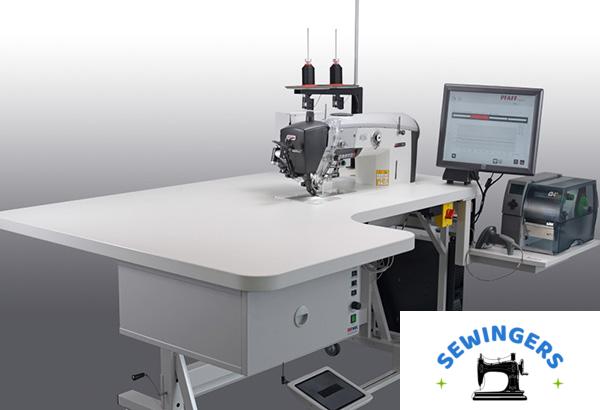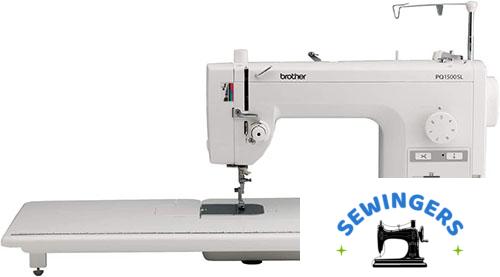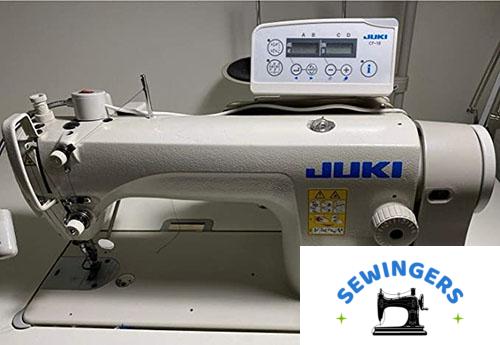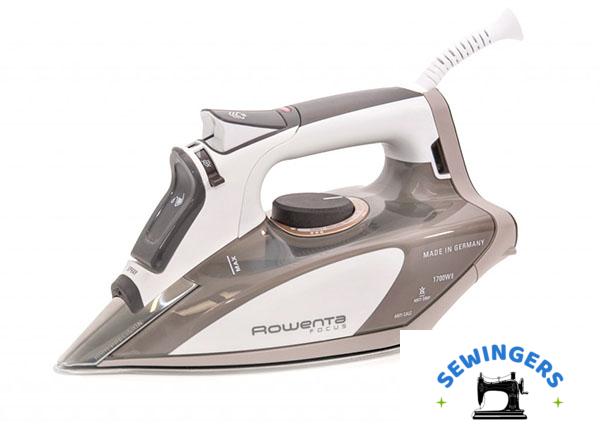
In the world of garment manufacturing, precision stitching is essential for producing high-quality, durable products. Unlike domestic sewing machines, which are designed for light use, industrial sewing machines are built for continuous operation on production lines. These heavy-duty sewing machines deliver superior stitch accuracy, enhanced fabric handling, and unmatched stitch consistency, making them indispensable in large-scale manufacturing.
Businesses and professionals rely on industrial-grade stitching to meet high production demands while maintaining efficiency. Equipped with powerful motors, advanced feed mechanisms, and specialized needles, these machines can handle thick fabrics, multiple layers, and intricate designs with ease. Understanding the industrial sewing machine benefits can help manufacturers optimize their workflows, reduce errors, and improve overall productivity.
Contents
- 1 Key Features to Look for in an Industrial Sewing Machine
- 2 Comparing Mechanical vs. Computerized Industrial Sewing Machines: Which One Fits Your Industry?
- 3 How to Maintain an Industrial Sewing Machine for Longevity
- 4 5 Top-Rated Industrial Sewing Machine With Reviews
- 5 Common Problems & Troubleshooting Tips for Industrial Sewing Machines
- 6 Where to Buy the Best Industrial Sewing Machines
- 7 Choosing the Right Industrial Sewing Machine for Your Needs
Key Features to Look for in an Industrial Sewing Machine
Choosing the right industrial sewing machine requires understanding key components that impact performance, durability, and efficiency. The best features in industrial sewing machines include advanced motor systems, precision stitch control, and robust construction.
1. Motor Type: Clutch vs. Servo Motor
The motor is the powerhouse of an industrial sewing machine. Traditional clutch motors provide high torque but operate continuously, making them noisier and less energy-efficient. In contrast, servo motors offer precise torque control, quieter operation, and lower energy consumption. For applications requiring variable speed and intricate stitching, a servo motor is the superior choice.
2. Stitch Speed and Control Settings
High-speed stitching machines can reach speeds of 5,000+ stitches per minute, but control settings are crucial for precision. Features like stitch regulators and adjustable feed dogs ensure even fabric feeding and consistent stitch length. A well-calibrated thread tension system prevents thread breakage and enhances stitch quality.
3. Build Quality: Metal vs. Plastic Components
Durability depends on the machine’s construction. Industrial models with metal frames and internal gears provide superior stability and longevity compared to plastic alternatives. A well-designed lubrication system further extends the machine’s lifespan by reducing wear on moving parts.
4. Automation and Programmable Features
Modern industrial sewing machines integrate automation for efficiency. Features like automatic fabric feeders, programmable stitch patterns, and digital control panels streamline production. Some models also include LED lighting for better visibility and precision work.
Comparing Mechanical vs. Computerized Industrial Sewing Machines: Which One Fits Your Industry?
Choosing between a mechanical sewing machine and a computerized sewing machine depends on industry needs, production scale, and budget. Mechanical models offer durability and straightforward operation, making them ideal for heavy-duty applications like leatherwork and upholstery. In contrast, computerized industrial sewing machines provide stitch programming, software integration, and automated tension adjustment, enhancing precision and efficiency in high-volume garment production and embroidery.
In terms of speed and accuracy, computerized machines outperform mechanical ones due to memory functions, extensive stitch libraries, and error detection systems. These features minimize human error, making them ideal for industries requiring intricate designs, such as fashion and automotive upholstery. However, the initial cost of a programmable sewing machine is higher, but it reduces labor costs and material waste over time. Mechanical models, on the other hand, require lower upfront investment but may need more frequent manual adjustments and skilled operators. Ultimately, businesses must weigh automation benefits vs. long-term maintenance and training costs when choosing between manual vs. automatic sewing machines.
How to Maintain an Industrial Sewing Machine for Longevity
Proper maintenance ensures an industrial sewing machine operates smoothly and lasts for years. Regular cleaning and lubrication prevent excessive wear and mechanical failures. Remove lint buildup daily, especially around the bobbin case, feed dogs, and tension disc, using a small brush or compressed air. Oiling a sewing machine is crucial—apply sewing machine oil to all lubrication points, including the timing belt and moving joints, according to the manufacturer’s guidelines.
Replacing needles regularly prevents thread snags and uneven stitching. Change needles after 8-10 hours of use or when signs of wear detection, such as skipped stitches or fabric pulls, appear. Proper thread and fabric handling also reduces strain on the machine. Avoid forcing thick materials through, and adjust thread tension to prevent bobbin case jamming. If you hear unusual noises, check for loose screws or timing misalignment. Following these best practices for sewing machine care minimizes breakdowns and extends machine life.
5 Top-Rated Industrial Sewing Machine With Reviews
Industrial sewing machines are essential for professionals working in tailoring, upholstery, and quilting, where durability and precision are non-negotiable. Unlike domestic models, these machines feature powerful motors, reinforced frames, and advanced stitch control to handle thick fabrics like leather, denim, and canvas. Their high sewing speed and consistent stitch quality make them the go-to choice for mass production and intricate detailing. From adjusting thread tension and presser foot pressure to utilizing specialized needle systems and feed dogs, industrial machines offer unmatched efficiency for heavy-duty projects.
When choosing the best heavy-duty sewing machine, key factors include motor power, fabric compatibility, and bobbin type. Whether you’re working with delicate silk or multiple layers of upholstery fabric, selecting the right professional sewing machine ensures smoother operation and longevity. In this guide, we’ll explore the top-rated industrial sewing machines, their standout features, and how they compare to domestic models in terms of performance and durability.
1. Juki HZL-DX7 Sewing Machine
The Juki HZL-DX7 is a high-precision computerized sewing machine designed for both industrial and home use. It features an advanced box feed system, ensuring smooth fabric handling for various materials, from lightweight silk to heavy denim. The automatic needle threader simplifies setup, while the LCD screen allows easy selection of 287 built-in stitch patterns, including a professional-grade buttonhole system. The adjustable presser foot pressure and speed control offer precision, making it ideal for intricate sewing projects. Additionally, the LED light enhances visibility, and the bobbin winder ensures efficient thread management.
Pros:
- Exceptional stitch quality with a reliable box feed system.
- Customizable sewing speed for controlled stitching.
- Versatile stitch patterns for decorative and utility sewing.
- Durable and powerful enough for heavy-duty projects.
Cons:
- Premium price compared to entry-level models.
- Slight learning curve due to advanced features.
- Bulky design, requiring dedicated workspace.
The Juki HZL-DX7 is one of the best Juki sewing machines for those seeking a computerized industrial sewing machine with high precision. Whether you’re working on delicate fabrics or heavy-duty sewing projects, its innovative features provide professional-level results.
2. Brother PQ1500SL Quilting And Sewing Machine
The Brother PQ1500SL is a high-speed sewing machine designed for quilters and heavy-duty sewing projects. With a maximum speed of 1,500 stitches per minute, it delivers exceptional straight-stitch precision, making it ideal for quilting, upholstery, and thick fabric layers. The adjustable pin feed system enhances fabric control, preventing shifting or puckering. The fabric extension table provides ample workspace, while the automatic thread cutter and needle up/down function improve efficiency. Additionally, the speed regulator allows precise adjustments, and the knee lifter enables hands-free presser foot operation for seamless quilting.
Pros:
- Fast and precise straight stitching for professional-quality results.
- Heavy-duty construction for long-term durability.
- Adjustable feed dog height and thread tension dial for superior stitch control.
- Large extension table for handling bulky quilting projects.
Cons:
- Limited to straight stitching, making it less versatile for decorative work.
- No automatic needle threading, requiring manual setup.
- Heavy and large, requiring dedicated workspace.
The Brother PQ1500SL is one of the best industrial quilting machines, combining speed, power, and precision. Whether you’re a professional quilter or need a heavy-duty sewing machine for thick fabrics, it offers outstanding performance and reliability.
3. Juki TL-2000Qi Sewing And Quilting Machine
The Juki TL-2000Qi is a high-speed straight-stitch machine designed for quilters and sewing professionals. With a one-needle lockstitch mechanism, it delivers exceptional stitch precision, making it perfect for quilting, tailoring, and home décor projects. The aluminum die-cast arm and bed minimize vibrations, ensuring smooth and stable sewing, even at high speeds. An integrated LED light improves visibility, while the extended work area provides ample space for handling large quilts and heavy fabrics. The automatic needle threader and drop feed mechanism enhance usability, allowing for seamless free-motion quilting.
Pros:
- Superior stitch accuracy with a high-speed straight stitch mechanism.
- Low vibration design due to its aluminum frame, ensuring stability.
- Extended work area for quilting and large sewing projects.
- Speed control slider for precise stitch regulation.
Cons:
- Limited to straight stitching, not ideal for decorative sewing.
- Manual thread tension adjustment, requiring experience for fine-tuning.
- No built-in stitch patterns, making it best suited for quilting and professional use.
The Juki TL-2000Qi remains one of the best Juki industrial sewing machines, combining power, precision, and durability. Whether you’re a professional tailor or a dedicated quilter, its high-speed performance and low-vibration mechanism make it an excellent investment.
4. Janome Industrial HD1000 Sewing Machine
The Janome HD1000 is a mechanical sewing machine built for heavy-duty performance, making it an excellent choice for sewing thick materials like leather, denim, and canvas. Its cast-aluminum body provides industrial-grade durability, ensuring stability and longevity. With 14 built-in stitches and a four-step buttonhole function, it offers versatility for both basic and decorative sewing. The reverse stitch lever reinforces seams, while the drop feed dogs enable free-motion quilting and darning. Additionally, the automatic bobbin winding system and thread tension adjustment enhance usability, making it a reliable machine for both beginners and professionals.
Pros:
- Strong aluminum frame for stability and durability.
- Handles thick fabrics like leather, denim, and upholstery materials.
- Easy-to-use stitch selection dial for quick adjustments.
- Reverse stitching function for added seam strength.
Cons:
- Limited built-in stitches compared to computerized models.
- No speed control slider, relying on foot pedal control.
- Mechanical operation, requiring manual thread tension adjustments.
The Janome HD1000 stands out as one of the best heavy-duty sewing machines, offering industrial-grade power in a user-friendly design. Whether you’re working on leather projects or thick quilting layers, this top mechanical sewing machine delivers consistent, high-quality stitches with long-lasting durability.
5. Juki DDl-8700-H Industrial Sewing Machine![]()
The Juki DDL-8700-H is a high-speed industrial sewing machine engineered for heavy-duty applications, making it ideal for apparel manufacturing, upholstery, and thick fabrics. Its single-needle lockstitch operation ensures precise, consistent stitches, while the servo motor provides powerful yet energy-efficient performance. The industrial table offers a stable workspace, and the vibration reduction system enhances sewing comfort, even at high speeds. With an oil lubrication system for smooth operation, a thread take-up lever for optimal thread control, and a safety clutch to prevent damage, this machine delivers reliable industrial-grade sewing.
Pros:
- Powerful servo motor for high-speed, energy-efficient operation.
- Precise lockstitch mechanism, perfect for professional garment production.
- Vibration reduction system for smooth, stable sewing.
- Bobbin winder and needle positioner for improved efficiency.
Cons:
- Limited to straight stitching, not suitable for decorative designs.
- Requires an industrial table setup, making it less portable.
- Manual thread tension adjustments may require experience.
The Juki DDL-8700-H is one of the best industrial sewing machines for professional garment production and heavy-duty fabrics. With its high-speed lockstitch precision and durable build, it’s a top-rated Juki sewing machine for factories, tailors, and serious sewing professionals.
Common Problems & Troubleshooting Tips for Industrial Sewing Machines
Industrial sewing machines are essential for high-speed, precise stitching, but frequent issues like thread tension problems, bobbin malfunctions, and stitch irregularities can disrupt operations. One of the most common problems is thread breaking, often caused by incorrect thread tension, improper threading, or damaged needles. To fix this, check the upper thread tension, ensure the thread follows the correct path, and replace any bent or blunt needles. If skipped stitches occur, inspect the timing mechanism, adjust the presser foot pressure, and verify that the feed dogs are clean and functioning correctly.
Another issue is bobbin-related problems, such as uneven stitching or jamming. Incorrect bobbin thread tension, dirt in the bobbin case, or a poorly wound bobbin can cause disruptions. Clean the bobbin area, wind the bobbin evenly, and use the correct bobbin size for your machine model. Additionally, motor overheating and speed fluctuations can indicate excessive workload or inadequate lubrication. Regular maintenance, including oiling key components and adjusting motor speed settings, can prevent long-term damage.
Where to Buy the Best Industrial Sewing Machines
Finding a reliable source for high-quality industrial sewing machines is crucial for businesses seeking durability, efficiency, and long-term value. Top sewing machine brands like Juki, Brother, and Consew offer machines designed for heavy-duty use, but where you buy them significantly impacts pricing, warranty, and after-sales support. Factory-direct purchases ensure authentic products with full manufacturer warranties, while authorized sewing machine dealers provide personalized recommendations and technical support. Online platforms such as Amazon, Alibaba, and dedicated sewing equipment retailers often offer bulk purchase discounts and financing options, but verifying seller credibility is essential.
When deciding between new vs. used sewing machines, consider long-term costs and maintenance needs. New machines come with full warranty service and customer support, making them ideal for businesses prioritizing reliability. Second-hand markets, including refurbished equipment dealers and auction platforms, provide affordable industrial sewing machines, but assessing machine condition and return policies is critical. Local purchases allow hands-on inspections and easier returns, whereas online shopping offers a broader selection and competitive industrial sewing machine deals. Whether buying online or locally, comparing refund policies, shipping logistics, and after-sales service ensures a smart investment.
Choosing the Right Industrial Sewing Machine for Your Needs
Selecting the best industrial sewing machine for your business requires balancing cost-efficiency, skill level, and industry needs. Matching machine features to your production goals is essential—high-speed models enhance productivity, while specialized machines like overlock or coverstitch models cater to specific sewing techniques. Additionally, assessing durability factors and brand reputation ensures long-term reliability. A machine that aligns with your ROI (Return on Investment) strategy should provide consistent performance with minimal maintenance.
Beyond the machine itself, consider the learning curve and ease of use—a complex model may require more training, affecting operational efficiency. Investing in employee skill development ensures smoother adoption and maximizes output. Finally, weigh the initial cost against long-term benefits; the most reliable sewing machines offer better longevity, reducing downtime and repair expenses. Following a structured sewing machine buying guide helps businesses make informed decisions, ensuring the selected professional sewing equipment meets both current and future production demands.












